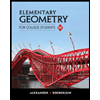P Preliminary Concepts 1 Line And Angle Relationships 2 Parallel Lines 3 Triangles 4 Quadrilaterals 5 Similar Triangles 6 Circles 7 Locus And Concurrence 8 Areas Of Polygons And Circles 9 Surfaces And Solids 10 Analytic Geometry 11 Introduction To Trigonometry A Appendix ChapterP: Preliminary Concepts
P.1 Sets And Geometry P.2 Statements And Reasoning P.3 Informal Geometry And Measurement P.CR Review Exercises P.CT Test SectionP.CT: Test
Problem 1CT Problem 2CT: For Exercises 1 and 2, let A={1,2,3,4,5},B={2,4,6,8,10},andC={2,3,5,7,11}. Find (AB)(AC) Problem 3CT: Give another name for: a)ABb)ABC Problem 4CT: If N{A}=31,N{B}=47,N{AB}=17,findN{AB}. Problem 5CT: At Rosemont High School, 14 players are on the varsity basketball team, 35 players are on the... Problem 6CT: Name the type of reasoning used in the following scenario. While shopping for a new television,... Problem 7CT: For Exercises 7 and 8, state a conclusion when possible. 1If a person studies geometry, then he/she... Problem 8CT: For Exercises 7 and 8, state a conclusion when possible. 1All major league baseball players enjoy a... Problem 9CT Problem 10CT: Statement P and Q are true while R is a false statement. Classify as true or false:... Problem 11CT: For Exercises 11 and 12, use the drawing provided. If AB=11.8andAX=6.9, find XB Problem 12CT: For Exercises 11 and 12, use the drawing provided. If AX=x+3,XB=x and AB=3x7, find x Problem 13CT: Use the protractor with measures as indicted to find ABC Problem 14CT Problem 15CT: a Which of these (AB,AB,orAB) represents the length of the line segment AB? b Which (mCBA, mCAB,or,... Problem 16CT: Let P represent any statement. Classify as true or false. a P and P b P or P Problem 17CT Problem 18CT: Given rhombus ABCD, use intuition to draw a conclusion regarding diagonals AC and DB. Problem 19CT: For ABC not shown, ray BD is the bisector of the angle. If mDBC=27, find mABC. Problem 20CT: In the figure shown, CD bisects AB at point M so that AM=MB. Is it correct to conclude that CM=MD? Problem 1CT
Related questions
draw a parallelogram with right angles and equal opposite sides
draw a parallelogram with slanted sides and no right angles
Figure in plane geometry formed by two rays or lines that share a common endpoint, called the vertex. The angle is measured in degrees using a protractor. The different types of angles are acute, obtuse, right, straight, and reflex.
Expert Solution
This question has been solved!
Explore an expertly crafted, step-by-step solution for a thorough understanding of key concepts.
Step by step
Solved in 2 steps with 3 images




